★★★½
“Based on real events. Yeah, righ…oh, heck! It is!”
 Most Aussies won’t thank you for mentioning it, but the colony was originally populated largely by the dregs of British society. Prisoners were shipped Down Under, thereby alleviating jail overcrowding and providing a cheap labour source for the new world. This mini-series recounts the story of one such unwilling emigrant, Mary Bryant, shipped off to Oz for a petty theft. She gives birth to one child en route, and has another there, but when starvation threatens her family, she plans a daring escape, and convinces her co-convicts to help, even though they’re 3,000 miles from the nearest safe haven.
Most Aussies won’t thank you for mentioning it, but the colony was originally populated largely by the dregs of British society. Prisoners were shipped Down Under, thereby alleviating jail overcrowding and providing a cheap labour source for the new world. This mini-series recounts the story of one such unwilling emigrant, Mary Bryant, shipped off to Oz for a petty theft. She gives birth to one child en route, and has another there, but when starvation threatens her family, she plans a daring escape, and convinces her co-convicts to help, even though they’re 3,000 miles from the nearest safe haven.
It’s a compelling story; we intended to watch the two parts separately, but we had to carry straight on (though the cliff-hanger it contains is a huge cheat). It’s a solid period drama, enhanced by Garai’s fully-committed performance as the heroine, and captures the wretched conditions of life below deck on the transport ships. Similarly, it’s fascinating to see early Botany Bay life, with the rigid division between haves and have-nots – Neill plays the governor, while Davenport largely reprises his Pirates of the Caribbean role as straight-faced Navy officer Lt. Clarke; both are good in their roles. There’s one nasty sequence of anarchy, where the guards just sit back and wait for things to burn out, which says much about the pragmatic approach adopted.
Would have liked to see Mary do more; she’s a bit passive, not feisty enough to be a truly memorable action heroine. And this does lose pace; early in the second half, once the escape has taken place, it occasionally verges on dull – something of a surprise, given the potential for tension of six criminals in a small boat. It’s set up that treachery is the name of the game, but that angle is never explored at all. Things perk up again later, and overall, this is an entertaining three hours, with a rousing finale, which’d frankly be very difficult to believe…if it wasn’t actually based on fact. This brings me to:
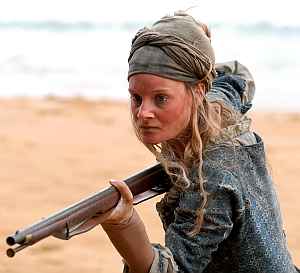 Here be historical spoilers I was surprised how close this was to the truth. Bryant was a Cornish convict, transported to Australia, who did take part in a break-out. Though captured in Timor and returned to Britain, there was indeed a public outcry, and those involved were pardoned. The main dramatic invention is Clarke’s relationship with Mary; he certainly didn’t kill her husband, who actually died of natural causes during the voyage back to Britain. The nod to James Boswell is legitimate too, as he was among those who campaigned for her release. Various books have been written about her; Google is your friend if you want to find out about these.
Here be historical spoilers I was surprised how close this was to the truth. Bryant was a Cornish convict, transported to Australia, who did take part in a break-out. Though captured in Timor and returned to Britain, there was indeed a public outcry, and those involved were pardoned. The main dramatic invention is Clarke’s relationship with Mary; he certainly didn’t kill her husband, who actually died of natural causes during the voyage back to Britain. The nod to James Boswell is legitimate too, as he was among those who campaigned for her release. Various books have been written about her; Google is your friend if you want to find out about these.
The DVD was released in the US on March 27th by MTI Home Video.
Dir: Peter Andrikidis
Stars: Romola Garai, Alex O’Loughlin, Jack Davenport, Sam Neill





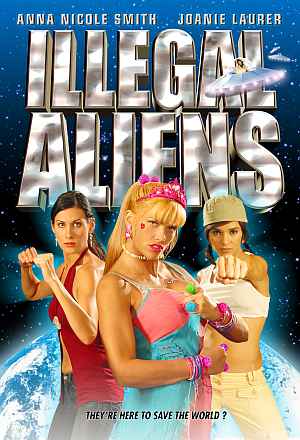 Okay, her swansong won’t be up there with James Dean’s or Bruce Lee’s, but this does at least sense its own idiocy, rendering the movie somewhat bullet-proof, critically speaking. It’s supposed to be dumb, wildly implausible and hideously over-acted. So condemning it for these flaws is complaining because your hotdog tastes of meat. A trio of shape-shifting aliens land on Earth to protect it from the scum of the universe. Thanks to their first encounter with our culture coming in the shape of a porno mag, they opt for the form of attractive women. Two end up getting jobs as FX/stunt people in Hollywood – a sadly underexplored angle – while the third is…Anna Nicole Smith. Then their nemesis (Laurer, the actress formerly known as Chyna) turns up, taking over the body of a mobster’s wife, and prepares to bring about the end of the world. Can she be stopped?
Okay, her swansong won’t be up there with James Dean’s or Bruce Lee’s, but this does at least sense its own idiocy, rendering the movie somewhat bullet-proof, critically speaking. It’s supposed to be dumb, wildly implausible and hideously over-acted. So condemning it for these flaws is complaining because your hotdog tastes of meat. A trio of shape-shifting aliens land on Earth to protect it from the scum of the universe. Thanks to their first encounter with our culture coming in the shape of a porno mag, they opt for the form of attractive women. Two end up getting jobs as FX/stunt people in Hollywood – a sadly underexplored angle – while the third is…Anna Nicole Smith. Then their nemesis (Laurer, the actress formerly known as Chyna) turns up, taking over the body of a mobster’s wife, and prepares to bring about the end of the world. Can she be stopped? There’s no doubt this film is, if not cashing in on her death, certainly shrugging its shoulders and taking advantage of an unfortunate situation. I don’t really blame them for that, even if anyone looking for skin will be wasting their time here. In sharp contrast to her previous, ah, body of work, AN’s clothes remain on; as exploitation goes, this is tame and restrained. And that may be the main problem: a failure by the makers to decide which way to go. SF/action or all-out comedy? There’s enough of each to suggest, with greater commitment, either might have worked better. Instead, it comes off as somewhat lukewarm – can’t say we were ever bored, yet I can’t say I was ever more than mildly amused.
There’s no doubt this film is, if not cashing in on her death, certainly shrugging its shoulders and taking advantage of an unfortunate situation. I don’t really blame them for that, even if anyone looking for skin will be wasting their time here. In sharp contrast to her previous, ah, body of work, AN’s clothes remain on; as exploitation goes, this is tame and restrained. And that may be the main problem: a failure by the makers to decide which way to go. SF/action or all-out comedy? There’s enough of each to suggest, with greater commitment, either might have worked better. Instead, it comes off as somewhat lukewarm – can’t say we were ever bored, yet I can’t say I was ever more than mildly amused.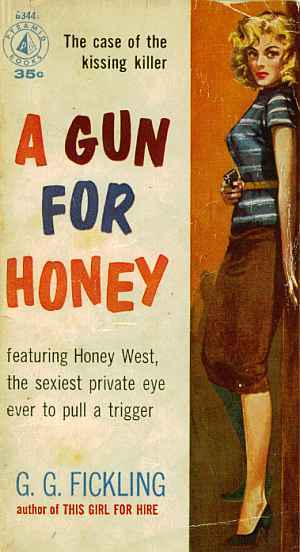 Honey West is best known as the heroine of a mid-60’s TV show created by Aaron Spelling, starring Anne Francis. But her origins actually date back almost a decade further, to a series of pulp detective novels written by Forest Fickling, under the vaguely-pseudonymic name of G.G.Fickling – his wife was Gloria, which may explain the choice. The heroine is a private eye, who follows her father into the profession, after he was killed on the job. These adventures, judging by A Gun for Honey, are rather more hard-boiled, and occasionally risque, than the TV show, though even in the book, the characters never actually seem to do “it”.
Honey West is best known as the heroine of a mid-60’s TV show created by Aaron Spelling, starring Anne Francis. But her origins actually date back almost a decade further, to a series of pulp detective novels written by Forest Fickling, under the vaguely-pseudonymic name of G.G.Fickling – his wife was Gloria, which may explain the choice. The heroine is a private eye, who follows her father into the profession, after he was killed on the job. These adventures, judging by A Gun for Honey, are rather more hard-boiled, and occasionally risque, than the TV show, though even in the book, the characters never actually seem to do “it”.
 Grindhouse harkens back to an earlier time, when the only way to see cult or obscure movies was at your local fleabag cinema or drive-in. There was an entire industry of low-budget studios, like AIP, set up to create product for these outlets: knowing they couldn’t hope to compete in the areas of stars or general quality, they resorted instead to the old stand-bys of sex and violence. They flourished, roughly from the sixties to the end of the seventies, but the steady rise of home-entertainment media spelt their death-knell – at least as far as theatrical releases went. However, their films were an influence on many film-makers, and some of them have teamed up to bring you this love-letter to the genre, of the sort probably not seen for a couple of decades.
Grindhouse harkens back to an earlier time, when the only way to see cult or obscure movies was at your local fleabag cinema or drive-in. There was an entire industry of low-budget studios, like AIP, set up to create product for these outlets: knowing they couldn’t hope to compete in the areas of stars or general quality, they resorted instead to the old stand-bys of sex and violence. They flourished, roughly from the sixties to the end of the seventies, but the steady rise of home-entertainment media spelt their death-knell – at least as far as theatrical releases went. However, their films were an influence on many film-makers, and some of them have teamed up to bring you this love-letter to the genre, of the sort probably not seen for a couple of decades. There’s a fine sense of escalation, from the relatively-subdued opening, through to the insane climax, in which Cherry – now fitted with an automatic weapon in place of a limb which was torn off her during an earlier attack – takes on an entire army of the undead. Ludicrous? Over-the-top? Nonsensical? Hell, yes. Wouldn’t have it any other way. About the only weakness is a tendency to go overboard with the trappings of grindhouse flicks, such as missing reels, scratched film, etc. far beyond the point at which it’s amusing. We get it. I said, we get it. Thank you. Fortunately, the DVD should have the “restored” i.e. un-screwed with version.
There’s a fine sense of escalation, from the relatively-subdued opening, through to the insane climax, in which Cherry – now fitted with an automatic weapon in place of a limb which was torn off her during an earlier attack – takes on an entire army of the undead. Ludicrous? Over-the-top? Nonsensical? Hell, yes. Wouldn’t have it any other way. About the only weakness is a tendency to go overboard with the trappings of grindhouse flicks, such as missing reels, scratched film, etc. far beyond the point at which it’s amusing. We get it. I said, we get it. Thank you. Fortunately, the DVD should have the “restored” i.e. un-screwed with version. This section has the usual problem of Tarantino movies: he’s in love with his own dialogue, especially during an immensely-talky first half. And making the problem worse, the words never seem like they’re coming out of the characters’ mouths, but it is all too easy to imagine Quentin Tarantino saying them. Self-indulgent, meaningless drivel, full of pop culture references, he believes will make you think, “How clever!” – unfortunately, the result is closer to “What a poser!” This gets old really quickly, and when things get going in the second half, it’s a blessed relief. If you need to use the bathroom, quite likely in a 195-minute event like this, early on in Death Proof is definitely the time. You won’t be missing anything at all, and I suspect it might have been better if the two directors here had swapped scripts.
This section has the usual problem of Tarantino movies: he’s in love with his own dialogue, especially during an immensely-talky first half. And making the problem worse, the words never seem like they’re coming out of the characters’ mouths, but it is all too easy to imagine Quentin Tarantino saying them. Self-indulgent, meaningless drivel, full of pop culture references, he believes will make you think, “How clever!” – unfortunately, the result is closer to “What a poser!” This gets old really quickly, and when things get going in the second half, it’s a blessed relief. If you need to use the bathroom, quite likely in a 195-minute event like this, early on in Death Proof is definitely the time. You won’t be missing anything at all, and I suspect it might have been better if the two directors here had swapped scripts.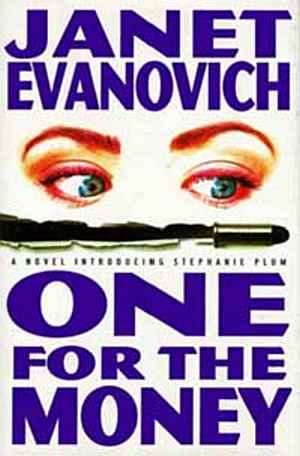 Former romance writer Evanovich switched genres and hit paydirt immediately with the first in the series, describing the adventures of former Newark lingerie buyer Stephanie Plum. She’s forced, through financial misadventure, to find a new job, and goes for a job filing paperwork for her bail bondsman cousin, but ends up hunting FTA’s (those who Failed To Appear for their court date) instead. She starts at the top, with suspended cop Joe Morelli, who has vanished after being accused of shooting an unarmed man. But as the witnesses to the incident start to die, Plum realises things may not be what they seem. The novice bounty huntress is well out of her depth, not least when she crosses psycho boxer Ramirez – until help comes from an unexpected source…
Former romance writer Evanovich switched genres and hit paydirt immediately with the first in the series, describing the adventures of former Newark lingerie buyer Stephanie Plum. She’s forced, through financial misadventure, to find a new job, and goes for a job filing paperwork for her bail bondsman cousin, but ends up hunting FTA’s (those who Failed To Appear for their court date) instead. She starts at the top, with suspended cop Joe Morelli, who has vanished after being accused of shooting an unarmed man. But as the witnesses to the incident start to die, Plum realises things may not be what they seem. The novice bounty huntress is well out of her depth, not least when she crosses psycho boxer Ramirez – until help comes from an unexpected source…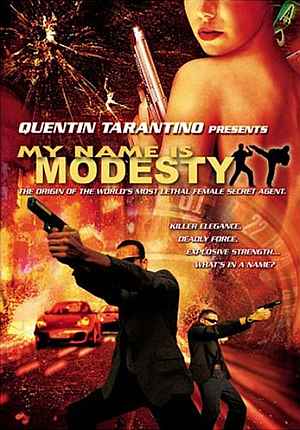 The word is, Miramax made this in order to keep their rights to the Modesty Blaise series active: I imagine a clause reverted them back to creator Peter O’Donnell, if unused within X years. Tarantino wanted to direct it, but couldn’t find the time, hence this stop-gap directed by journeyman Spiegel, who’s familiar with Quentin cast-offs, having also directed From Dusk Till Dawn 2. Shot in 18 Romanian days, the limitations of time and budget are clear [save admittedly copious flashbacks, the movie is almost all set in one location], but given them, it’s by no means a disaster. The main failing is the lack of action; we don’t see alleged jet-setting, goddess of kick-butt Blaise do much at all until the last few minutes. This may be because Staden looks as if she’d struggle to move forward in a stiff breeze; seeing her trading blows is unconvincing, and the fight choreographer should have focused on speed and/or agility instead. Though in terms of presence and steely gaze, she does fit the part well.
The word is, Miramax made this in order to keep their rights to the Modesty Blaise series active: I imagine a clause reverted them back to creator Peter O’Donnell, if unused within X years. Tarantino wanted to direct it, but couldn’t find the time, hence this stop-gap directed by journeyman Spiegel, who’s familiar with Quentin cast-offs, having also directed From Dusk Till Dawn 2. Shot in 18 Romanian days, the limitations of time and budget are clear [save admittedly copious flashbacks, the movie is almost all set in one location], but given them, it’s by no means a disaster. The main failing is the lack of action; we don’t see alleged jet-setting, goddess of kick-butt Blaise do much at all until the last few minutes. This may be because Staden looks as if she’d struggle to move forward in a stiff breeze; seeing her trading blows is unconvincing, and the fight choreographer should have focused on speed and/or agility instead. Though in terms of presence and steely gaze, she does fit the part well.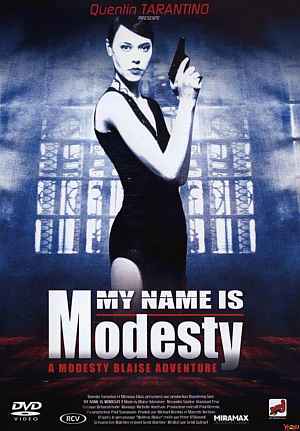 I remember the books from my youth, and the huge disappointment I felt when I saw the 1966 camp abortion starring Monica Vitti [there was also an 1982 TV pilot, with Ann Turkel, which I haven’t found]. This “origin” story is an improvement, at least taking the characters seriously. Blaise is trapped in a casino by a robber with a grudge against the owner (Waldau), and as they wait for the guy with the safe combination to arrive, she trades stories of her past for the freedom of the other hostages, Arabian Nights style, almost. I’d be somewhat curious to see the original cut, which apparently ran nearly two hours. Now, it’s barely 70 minutes between Bond-esque opening and closing credits, yet is still pretty talky, Blaise and her mentor (Pearson) meandering between the Balkans and Morocco.
I remember the books from my youth, and the huge disappointment I felt when I saw the 1966 camp abortion starring Monica Vitti [there was also an 1982 TV pilot, with Ann Turkel, which I haven’t found]. This “origin” story is an improvement, at least taking the characters seriously. Blaise is trapped in a casino by a robber with a grudge against the owner (Waldau), and as they wait for the guy with the safe combination to arrive, she trades stories of her past for the freedom of the other hostages, Arabian Nights style, almost. I’d be somewhat curious to see the original cut, which apparently ran nearly two hours. Now, it’s barely 70 minutes between Bond-esque opening and closing credits, yet is still pretty talky, Blaise and her mentor (Pearson) meandering between the Balkans and Morocco.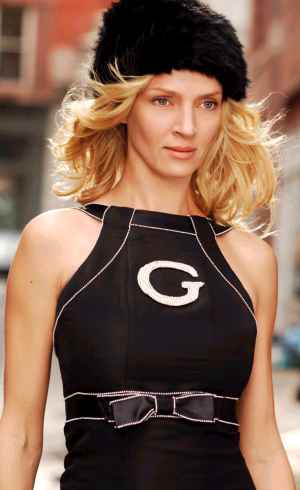 There’s certainly plenty of potential in the idea: how do you break up with your girlfriend, when she’s not just needy and possessive, but also has superhuman strength, the ability to fly and can boil your fishtank with her gaze? And the casting is, in general, excellent, too. Matt (Wilson) is an endearing everyman, and Thurman is perfect for capturing the mix of neuroses and power in G-Girl – her sequence where she pouts and refuses to save New York from a rogue missile is great. Izzard, naturally, steals almost every scene as supervillain Professor Bedlam [or “Barry”, as G-Girl knows him], though Riann Wilson matches him as Matt’s best friend, who talks a far better sexual game than he actually plays.
There’s certainly plenty of potential in the idea: how do you break up with your girlfriend, when she’s not just needy and possessive, but also has superhuman strength, the ability to fly and can boil your fishtank with her gaze? And the casting is, in general, excellent, too. Matt (Wilson) is an endearing everyman, and Thurman is perfect for capturing the mix of neuroses and power in G-Girl – her sequence where she pouts and refuses to save New York from a rogue missile is great. Izzard, naturally, steals almost every scene as supervillain Professor Bedlam [or “Barry”, as G-Girl knows him], though Riann Wilson matches him as Matt’s best friend, who talks a far better sexual game than he actually plays.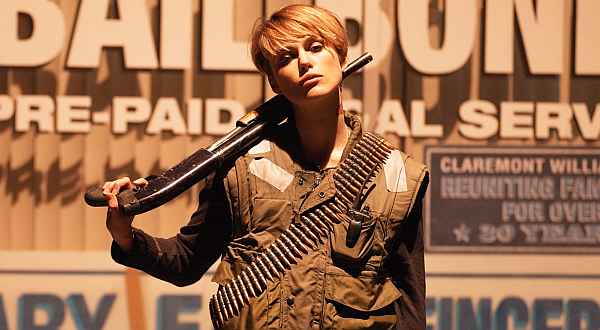 ★★½
★★½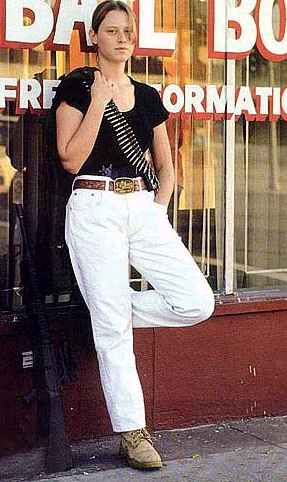 “This is based on a true story…sort of” is how the pre-credit disclaimer goes. Which does, at least, show far more honesty by Tony Scott than the usual claims in such things – Blair Witch and Wolf Creek shuffle their feet nervously. Unfortunately, my response would have to be, “This is a watchable movie…sort of.” Scott brings his usual, hyper-kinetic style to the table, but I was prepared for that and so didn’t mind it. No, the major problem was the derailment of the film from the potentially fascinating and probably unique character of Domino, into yet another heist movie. So instead of any insight into personality, we get to watch a bunch of gangsters and low-lives, of whom Domino is merely one, double-cross each other. It’s an hour of watching the corpse of Barbaro being beaten, if you get my drift; even Scott has been here before, to better effect, in True Romance.
“This is based on a true story…sort of” is how the pre-credit disclaimer goes. Which does, at least, show far more honesty by Tony Scott than the usual claims in such things – Blair Witch and Wolf Creek shuffle their feet nervously. Unfortunately, my response would have to be, “This is a watchable movie…sort of.” Scott brings his usual, hyper-kinetic style to the table, but I was prepared for that and so didn’t mind it. No, the major problem was the derailment of the film from the potentially fascinating and probably unique character of Domino, into yet another heist movie. So instead of any insight into personality, we get to watch a bunch of gangsters and low-lives, of whom Domino is merely one, double-cross each other. It’s an hour of watching the corpse of Barbaro being beaten, if you get my drift; even Scott has been here before, to better effect, in True Romance. The film is filled with distracting stunt casting in the minor roles. This includes Christopher Walken, Mena Suvari, Lucy Liu, Jacqueline Bisset, two guys from Beverly Hills 90210 playing themselves, Macy Gray, Tom Waits and even Jerry Springer, though the episode of his show here is far duller and more earnest than the real thing. Walken is, inevitably, the only one to make much of an impression, playing a reality TV producer who wants to make Domino a star. He’s described as having the attention span of a ferret on crystal meth, probably an adequate metaphor for the film as a whole. It lacks the patience to stay with and develop any of the characters, so sniffs around them for two minutes, before scurrying off to find someone else instead.
The film is filled with distracting stunt casting in the minor roles. This includes Christopher Walken, Mena Suvari, Lucy Liu, Jacqueline Bisset, two guys from Beverly Hills 90210 playing themselves, Macy Gray, Tom Waits and even Jerry Springer, though the episode of his show here is far duller and more earnest than the real thing. Walken is, inevitably, the only one to make much of an impression, playing a reality TV producer who wants to make Domino a star. He’s described as having the attention span of a ferret on crystal meth, probably an adequate metaphor for the film as a whole. It lacks the patience to stay with and develop any of the characters, so sniffs around them for two minutes, before scurrying off to find someone else instead.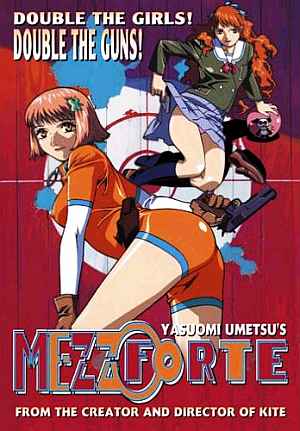 The Peach Twisters baseball team suck. This may be because the owner kills his pitcher with a baseball bat in the car-park, after losing a game? And he’s the model of restraint and sanity compared to his daughter, Momomi. The Danger Service Agency, a trio of troubleshooters, are hired to kidnap the owner (obviously, legality is a minor concern), but things go wrong, and he dies in the process. How can they escape this tricky situation? The core of the DSA is Mikura, who is a combat specialist, and easily the best thing in the group, as the other two are largely forgettable. But when Mikura goes into action, the film accelerates from 0-60 in about two seconds, which a cheerful, splattery approach that’s endearing. And she’s an upbeat character, which is a notable contrast to Umetsu’s other genre entry, Kite [Sawa, that show’s heroine, makes a cameo here].
The Peach Twisters baseball team suck. This may be because the owner kills his pitcher with a baseball bat in the car-park, after losing a game? And he’s the model of restraint and sanity compared to his daughter, Momomi. The Danger Service Agency, a trio of troubleshooters, are hired to kidnap the owner (obviously, legality is a minor concern), but things go wrong, and he dies in the process. How can they escape this tricky situation? The core of the DSA is Mikura, who is a combat specialist, and easily the best thing in the group, as the other two are largely forgettable. But when Mikura goes into action, the film accelerates from 0-60 in about two seconds, which a cheerful, splattery approach that’s endearing. And she’s an upbeat character, which is a notable contrast to Umetsu’s other genre entry, Kite [Sawa, that show’s heroine, makes a cameo here]. Why let Kei and Yuri blow up one case, when you can save time by giving them two at once? That’s what happens at the start of this, as the WWWA computer assigns them two, apparently unrelated, assignments in the same galactic sector: one is to investigate a spaceship which blew up, and the other involves the disappearance of a scientist and his family. You will not be surprised to hear that these two cases are interconnected, though it does appear to come as a shock to the participants here. Once they reach their destination, it soon becomes clear that someone is out to stop Kei and Yuri – “someone serious,” to steal a line from Leon. Can they uncover the conspiracy before it uncovers them?
Why let Kei and Yuri blow up one case, when you can save time by giving them two at once? That’s what happens at the start of this, as the WWWA computer assigns them two, apparently unrelated, assignments in the same galactic sector: one is to investigate a spaceship which blew up, and the other involves the disappearance of a scientist and his family. You will not be surprised to hear that these two cases are interconnected, though it does appear to come as a shock to the participants here. Once they reach their destination, it soon becomes clear that someone is out to stop Kei and Yuri – “someone serious,” to steal a line from Leon. Can they uncover the conspiracy before it uncovers them?